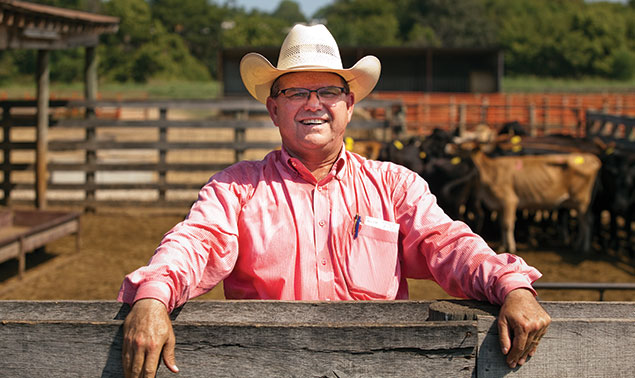
Photos by Randy Mallory
If you plan to buy cattle at the Sulphur Springs Livestock Commission, you'd better have a good night's sleep or some caffeine first. Under the gavel of auctioneer Joe Don Pogue, cattle are sold in a few blinks of the eye.
Pogue, who co-owns the Northeast Texas sale barn, has a reputation for running a fast, smooth auction. He's also known for treating his buyers and sellers right.
It's a reputation he's built since he first stepped up to the auction block as a teen. But Pogue has been talking the talk since before he could write.
At age 3, he dreamed of becoming a livestock auctioneer. By age 5 or 6, he'd mastered the auctioneer's rhythmic chant, his mother claimed.
"I'm self-learned. I credit it to going to sales with my granddaddy, who was a cattle buyer, and just listening to the auctioneers.I picked it up on my own and played auctioneer as a little boy," Pogue says. "I wanted to be an auctioneer and be in the cattle business."
Many kids never make it in the career they first imagine. But growing up on a beef and dairy operation where he learned about hard work and perseverance, Pogue succeeded early.
An Auctioneer at 15
His first chance to auctioneer came in 1974 at age 15, when his FFA club held a sale of items the members had created. The auctioneer, knowing Pogue's interest in the business, invited him to sell a few items. The following year, he was attending the Emory, Texas, cattle sale for his grandfather when the auctioneer, David Fowler, motioned to him to come up to the microphone.
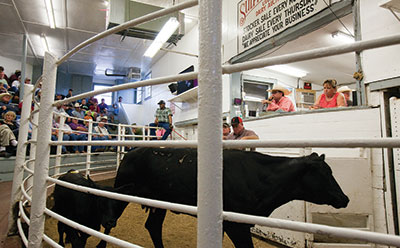
Approximately 75,000 head of cattle annually pass through the sale ring on Mondays at Sulphur Springs Livestock Commission.
"I've been selling ever since," he says.
Fowler hired Pogue to help him for the remainder of that year.
"He paid me $25 a day to help him, and I thought I was getting rich," he says, chuckling.
The summer of 1977 brought high school graduation for Pogue, marriage to his wife, Brynette, and the rapid development of his auction career. Within months, he was selling cattle or working area sales every day except Sunday — without ever attending auctioneering school. Over the next few years, he would work sales in the Texas towns of Emory, Mansfield, Greenville, Athens and Paris, as well as sales at two different auction barns in Sulphur Springs.
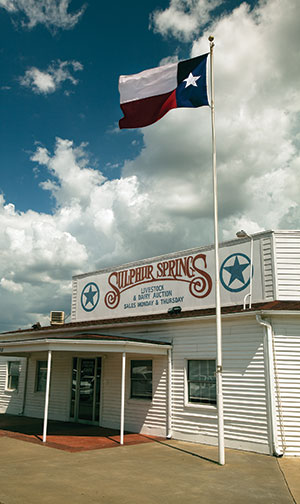
Sulphur Springs Livestock Commission sale barn
In 1983, Fowler and his partner started a dairy sale in Sulphur Springs, and asked Pogue to be the auctioneer for partial interest in the barn. Six years later, Pogue purchased half interest in Sulphur Springs Livestock Commission. Today, Fowler and Pogue continue to operate the business together, running approximately 75,000 head of cattle annually through the fast-paced Monday auctions, and several thousand head of dairy animals through their semi-monthly Thursday sales.
World Champion Auctioneer
In 1988, Pogue's skills at the microphone and in the sale ring were recognized when he was named World Champion Livestock Auctioneer. Judged on auctioning ability in a live auction and an interview about the livestock industry, he was declared the winner from 105 contestants. He now serves on the committee that helps plan the contest and oversee guidelines.
Along the way, however, he's experienced downs as well as ups. At one point in his career, he thought his dream might be over. He began losing his voice — a devastating fate for an auctioneer.
"If an auctioneer can't talk, he's not much good," Pogue says.
His voice would hold through a sale, but afterward he wouldn't be able to talk for days. When his throat doctor couldn't provide any answers, he consulted a chiropractor who discovered that a neck injury from a car wreck 10 years earlier had caused his vocal cords to shorten. Months of treatment brought his voice back to perfect condition.
Over the years, drought and new technology have contributed to a reduction in the number of livestock auction markets in Texas, from 167 in 1969 to 92 in 2013. However, the Sulphur Springs Livestock Commission has survived massive herd reductions by being a dual-purpose auction for beef and dairy cattle and a market for smaller producers.
"Your word and how you treat people is one of the biggest things you need to be a successful auctioneer."
— Joe Don Pogue
"When a small producer has to cut down, he only has a few cows he has to sell," Pogue says. "When big ranches run out of water, they have to sell numerous cows.
"We were fortunate during the drought to have a facility where people came to buy cattle and took them to the areas with grass. When the tides turned, those same people sent cattle back here for us to sell when we got grass."
Honesty Count
Struggling through cattle market cycles has been stressful for Pogue, who says he takes the price of cattle personally. His solution for surviving those tough times is prayer.But what determines success in the auction business, according to Pogue, is honesty and reputation.
"Your word and how you treat people is one of the biggest things you need to be a successful auctioneer," he says.
Legacy Ag Credit customer Kenny Baxter, who has sold cattle with Pogue since before he could drive, attests to Pogue's outstanding reputation among cattle producers.
"Joe Don always has great ideas to improve the industry," Baxter says. "You don't have to be around him many times to realize he knows what he is doing. He's proven himself time and time again to people around the state and country."
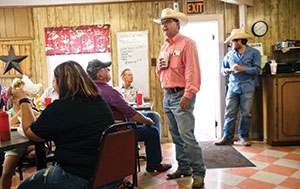
Joe Don Pogue visits with customers in the café.
Customer-Minded
Joseph Crouch, Legacy Ag Credit president and chief executive officer, attributes Pogue's success to evaluating and meeting the needs of prospective clients.
"Creating an opportunity for the cattlemen in Northeast Texas to market their cattle at a higher, more effective level is an example of how he approaches the marketplace with his customer base in mind," Crouch says. "Joe Don's positive contributions to the region's beef industry have been very significant in his services to the auction barn, as well as to the Northeast Texas Beef Improvement Organization."
But it's a two-way street for Pogue, who thrives on the reward he receives from dealing with great people.
"It's a joy to be able to work for my community and provide them a place to buy and sell cattle. I've been fortunate to deal with so many great people," Pogue says. "They are not just customers. I have a wide group I regard as friends in my business."
Pogue maintains his own 700-head cowherd plus about 2,000 to 2,300 head of stockers and heifers on grass. Along with running a small order-buying company, he also owns an interest in Wheeler Land & Livestock in Wheeler, Texas, where he keeps between 800 and 1,500 head on feed.
"My wife says if it doesn't moo, don't ask Joe Don anything about it," he says, laughing.
Pogue appreciates Farm Credit for helping him purchase land and build his house.

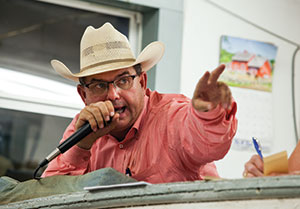
Joe Don Pogue acknowledges a bid.
"They helped me get started, and they have numerous customers who do business with me, so the institution plays a vital role in providing loans for land to people who sooner or later are going to have a cow," he says.
He believes the cattle market will stay strong for some time.
"People love beef, and as long as we can raise it and sell it at a reasonable price, I think we'll always have a job," Pogue comments.
And he hopes he'll always have the job he dreamed about decades ago.
"I plan on running the barn and being an auctioneer until I just can't go anymore," he adds. "I don't want to retire. I don't even think or talk about it. I want to be right here as long as I'm able."
NETBIO Stocker Sales Net Premiums for Producers
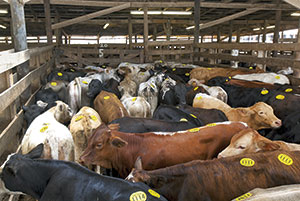
In 1998, a group of community-minded leaders, including the Sulphur Springs auction staff, bankers and veterinarians, initiated the Northeast Texas Beef Improvement Organization (NETBIO). Their plan was to improve the quality of area cattle and build a market for small East Texas producers.
Patterned after a similar program in Iowa, NETBIO requires that participating cattle producers follow a strict preconditioning process designed to create feedlot- or stocker-ready cattle. Calves must be weaned for at least 45 days, and receive a vaccination, worming, castration and dehorning protocol. A NETBIO ear tag allows traceability to the original owner.
Sulphur Springs Livestock Commission hosts six special stocker/feeder calf sales annually for nearly 300 participating producers from five states. Cattle are commingled into uniform load lots and can be viewed online. Each sale averages 3,500 to 5,000 head, sending cattle to feedyards as far away as Iowa.
"The buyer is willing to pay more because he knows he has less risk than if he buys an unweaned calf," auctioneer Joe Don Pogue says. "Not only does the seller earn money from the weight the calf gains during weaning, but the average premium per animal is close to $10 per hundredweight."
Kenny Baxter, a small producer who works full time off the farm, sells calves through NETBIO.
"NETBIO has given me an easier, more reliable way to market my cattle," he says. The special auctions are Baxter's main marketing tool, and he finds consistency in the process.
"No matter how big or small you are, you can sell at NETBIO, and I think you will be happy," Baxter comments. – Lisa Bryant
For more information, go to Sulphur Springs Livestock and Dairy Auction.